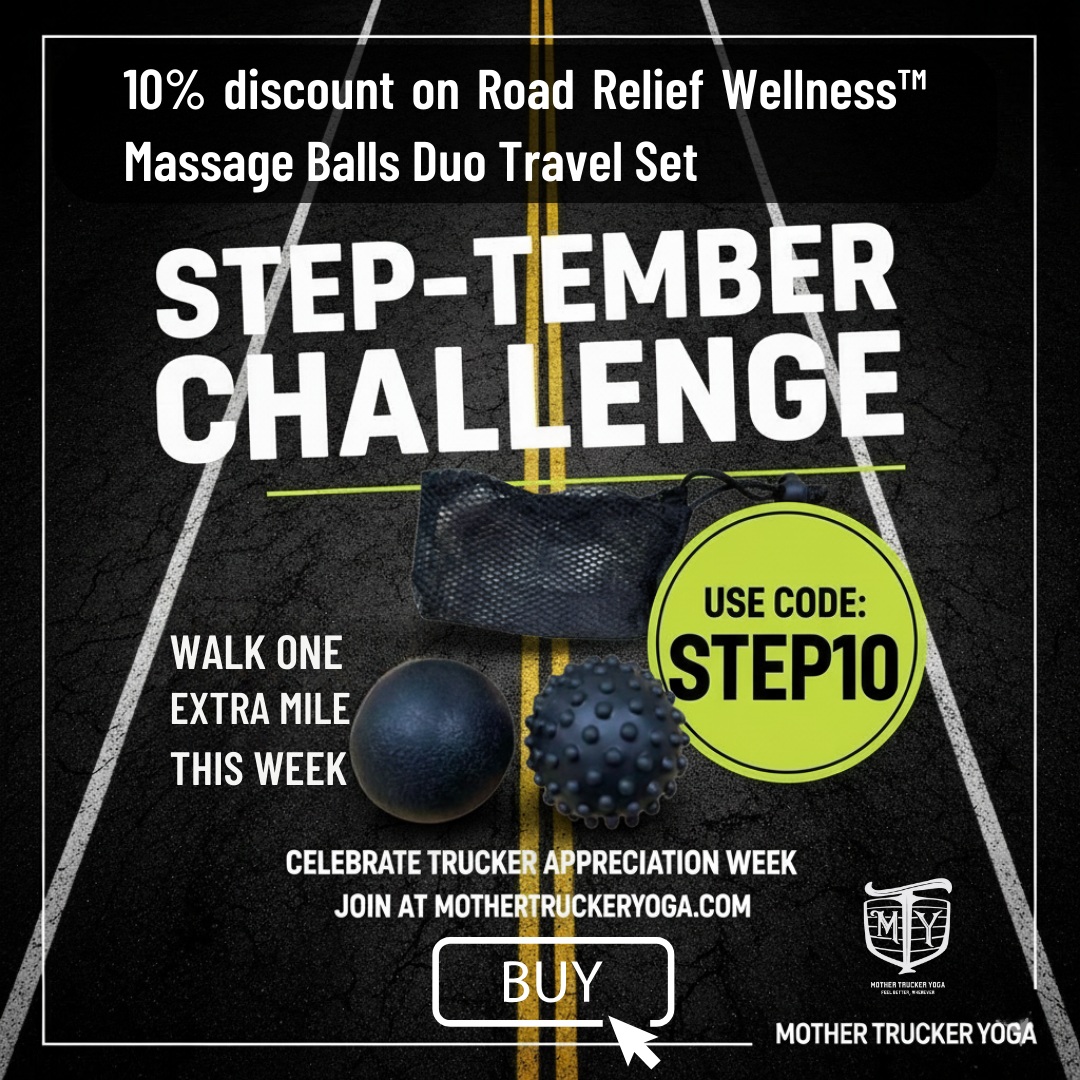Day 5 of STEP-tember: Why Every Step Counts for Truck Drivers
STEP-tember Day 5: Why Every Step Counts for Truck Drivers
Happy Trucker Appreciation Week, and welcome to Day 5 of STEP-tember! 🚛👣 We’re halfway through our walking challenge, and today’s focus is all about why walking is one of the simplest yet most powerful tools truck drivers can use to reclaim their health. walking for truck drivers
Many drivers believe fatigue, stiffness, and back pain are just part of the job. But the truth is—those symptoms often come from inactivity, not just age or long hours on the road. Walking is free, requires no equipment, and can be done anywhere, making it the most accessible form of exercise for truckers.
Why Walking Matters for Truck Drivers
Think about this: most of us push through our daily grind until pain, stiffness, or fatigue catches up. For truck drivers, this lifestyle can hit even harder, with long hours behind the wheel and limited movement.
But walking has proven benefits for drivers:
- Reduces stiffness – keeping joints flexible so even tying your shoes doesn’t feel like a chore.
- Boosts energy – instead of draining you, walking can actually help fight fatigue.
- Improves digestion and sleep – walking stimulates the body, reducing issues like constipation and restless legs.
- Protects long-term mobility – consistent movement keeps muscles, joints, and bones strong, helping prevent early decline.
This isn’t about doing more, faster, or longer. It’s about consistent small steps that add up to a healthier, more energized you.
The Power of 2,000 Steps
Did you know that one mile is roughly 2,000–2,500 steps? That’s just 15–20 minutes of gentle walking. For drivers who feel pressed for time, that’s less than one TV episode or a single phone call.
The truth is, time isn’t the issue—priorities are. When drivers shift their mindset to make walking a non-negotiable part of their daily routine, their health, energy, and even their mood improve dramatically.
Breaking the Excuses
Hope Zvara shares a powerful reminder: “I call BS on ‘I’m too busy.’” Whether you’re a truck driver, teacher, or parent, your health only becomes a priority when you decide it matters.
Excuses like “I’m too tired” or “I don’t have time” can keep drivers stuck in the same unhealthy patterns. The reality is:
- Walking actually energizes your body instead of draining it.
- Even 2,000 steps can make a big difference for energy, mood, and mobility.
- Your health impacts more than just you—it affects your family, career, and future.
A Simple Step to Better Health
Walking isn’t about hitting a marathon-level step goal. It’s about choosing progress over perfection. Every step you take is a step away from pain, fatigue, and preventable health issues.
So today, make a choice:
- Park a little farther from your destination.
- Walk a lap around the truck stop before heading in.
- Add an extra mile to your daily step count.
Each small effort builds momentum, and momentum creates lasting change.
Inbound Links:
- Learn more about simple yoga stretches for truckers to keep your body moving even on long hauls.
- Check out how posture affects driving safety and how walking supports better alignment.
External Link:
For more research on the benefits of walking, see Harvard Health: Walking for Health.
You May Also Like
Why Stretch Breaks Make Truckers Safer (and 5 You Can Do Anywhere)
Stretching keeps fatigue at bay and reduces injury risks for drivers on the road.
👉 Read it here
Learn more about fatigue prevention from the FMCSA Driver Safety Tips.
How Posture Affects Driving Safety (and How to Fix It on the Road)
Good posture improves focus and reduces back strain while driving long hours.
👉 Read it here
Explore Mayo Clinic’s ergonomics guide for posture-friendly habits.
Aching After a Long Haul? Try These Yoga Moves for On-the-Road Pain Relief
Relieve tight muscles and joint pain with quick yoga moves designed for drivers.
👉 Read it here
Check out additional strategies from the American Chiropractic Association.
Stressed Out on the Road? Here’s How Yoga Helps Truck Drivers Stay Calm
Discover how yoga reduces stress and helps truckers stay calm during long hauls.
👉 Read it here
Read more about stress management from the American Psychological Association.

